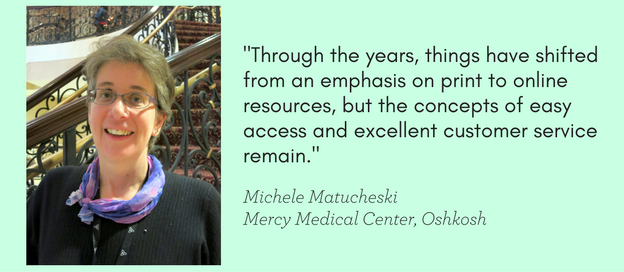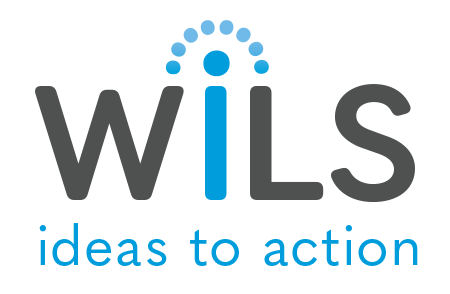
One of our greatest joys at WiLS is hearing our members tell the stories of the big and important work they are doing – interesting new projects or initiatives, or even interesting and new approaches to old projects. And, in addition to hearing about it, it makes us even happier when we can share those stories with other members. Each month, WiLS is proud to feature an interview with one of our library members. This month, we interview Michele Matucheski, MLS, AHIP, Librarian & Information Consultant, Clark Family Health Science Library at Mercy Medical Center in Oshkosh.
Why did you, personally, choose to work in libraries?
It was serendipity! In college, I went to the Library in search of the work study job list, expecting a job in the English Dept. They couldn’t find the list, and offered me a job in the Library instead as an assistant at the Reference Desk. I took a chance, and soon realized I loved it! I was helping to answer reference questions, testing ALL the bibliographic instruction scenarios, filing microfiche, and checking the catalog for a big acquisitions project. They had a top-of-the-line SilverPlatter work station there too. Boolean searching seemed so complicated then – now it’s my bread and butter in databases like PubMed and CINAHL! That job was a wonderful introduction to academic libraries and research in general. Even then, I enjoyed the sheer variety of the work, and the fact that I learned something new every single day.
At UW-Madison, the Medical Library Service always gave me work whenever I needed a job. I ran around the Library picking up articles to be ILLed. It was fun and interesting work, like a treasure hunt.
Through the years, things have shifted from an emphasis on print to online resources, but the concepts of easy access and excellent customer service remain.
What is unique about the culture of your library or libraries? How do you influence it?
I work in a health science library, serving physicians, nurses, and allied health professionals providing the best evidence for patient care. My physical library is based in a hospital, but the online library is where we have the biggest impact. At present, my territory covers the Fox Valley and north central Wisconsin from Oshkosh to Marshfield to Rhinelander to Door County. I’m responsible for filling the information needs of 10,000 health care employees spread across a wide geographic area. As a solo librarian, it’s no longer possible to provide personal 1:1 service for everyone. As we’ve scaled up, and conversely downsized library staff, we’ve had to change the way we deliver library services. One of the physicians I work with moved from Pediatrics to Administration after getting a Masters degree in Public Health. I asked why he made the change. His answer stuck with me. He said, “As a pediatrician, I impacted care for one person, one family at a time. With public health, we change policies and approaches, and I can have a much bigger impact on health care overall.“ Since I’m essentially a solo librarian, I’ve had to reframe my own practice to a more system-wide approach. I can’t be there for each and every nurse to help them research a question at the bedside, so we offer point-of-care tools and resources to help them help themselves. I do what I can remotely to support our staff with access to the tools, training, research, document delivery, and more. I work behind the scenes helping to provide the best evidence for patient care and policies. I may not do direct patient care, but my influence is there with every nurse and physician and allied health care professional who does.
What do you think is important to know about the patrons or community you work with? What helps you understand those needs?
For years, I was part of the Nursing Standards Team where we worked on patient care policies. As an integrated part of the team, I helped to make sure they included current best evidence and that these sources were referenced in the policies. Front line nurses shared what they actually do at the bedside, so we had a direct link from best evidence to current nursing practice. Working so closely with that group, I learned about their information needs, and was able to create a Nursing Standards LibGuide that made the most useful resources readily available for them. Working with these nurses also made me realize that the nurses and physicians have many, many things to keep track of in order to provide safe and consistent patient care. Checklists and point-of-care tools built into the electronic health record documentation are an excellent way to manage that complexity. I have tremendous respect for the work our physicians and nurses do each and every day.
What big ideas are being worked on at your library or libraries? What problems are being solved?
Since 2012, my company has undergone several big mergers from the regional integration of Affinity into Ministry Health Care to a national scale with Ascension Health. With each “leap” it’s been a bigger challenge to figure out how to get things done in the new matrix environment, especially when the infrastructure is not yet in place. No longer is it a simple signature to renew a library database license / contract. Now it has to pass by about 30 different people to get the proper approvals, and can take months to work through. We soon realized that the Contracts and Acquisitions people newly assigned with taking care of Library Contracts did not really understand how we use the resources or what we needed from the contracts. The corporate contracts people included standard contract language, but left out important things like assuring we’d be able to use online resources to fill ILL requests, or that the resources would be available to our staff remotely (with proper authentication). After some less than optimal contracts, we started working with them to build a Library License Vendor Template that included library-friendly language from LIBLICENSE and some of our older, well-crafted consortia contracts. This template has just recently been developed and will be used on a national level for new Ascension Library contracts. We are quite excited about this development, and hope it improves terms for future Library contracts all over the country.
At present, we are working on merging Library Services statewide as part of Ascension Wisconsin. This effort brings together Affinity Health System in the Fox Valley, Ministry Health Care in central and northern Wisconsin, Columbia-St Marys, and Wheaton-Franciscan in the Milwaukee area. I’m working with a team of 3 excellent medical Librarians who are helping to make this transition.
Do you have anything else you’d like to share here?
The project that brings me the most satisfaction is an oral history project with the nuns who founded my hospital and Ministry Health Care. I sit down with the Sisters one-on-one to do a StoryCorps type interview where the Sisters share highlights of their life and work. It’s fascinating to learn what these women have done with such humble beginnings. Many of the nuns were nurses or teachers. Some became hospital administrators and architects. Some were pioneers in social work and case management. One was even a plumber and an electrician. I am hoping to make some of these interviews available online in 2017, because they are such interesting and compelling stories.
——————
These interviews are part of a series of interviews with both WiLS library and vendor partners. Your feedback is appreciated. If you have any to offer on this article, or suggestions for upcoming interviews, contact Andrea Coffin at acoffin@wils.org.
